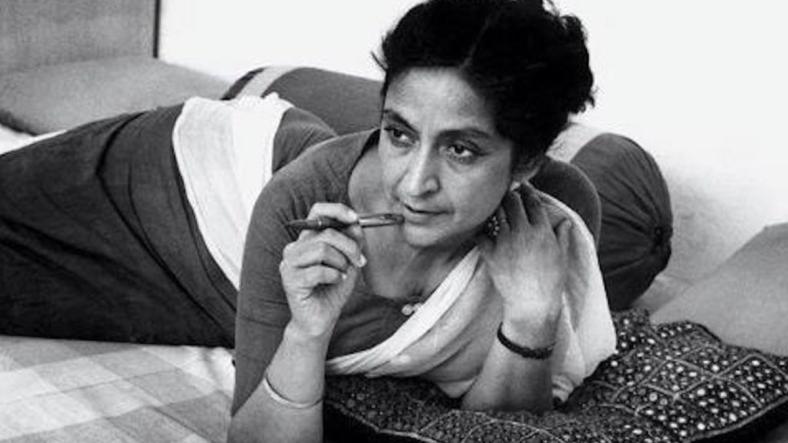Amrita Pritam (1919–2005) was one of the most celebrated literary figures in Indian history, known for her powerful and evocative poetry, novels, and essays. A writer, poet, and essayist primarily in Punjabi and Hindi, she became the first woman to win the Sahitya Akademi Award in India and remains a towering figure in Indian literature. Her works, which often explored themes of love, loss, feminism, and Partition, continue to resonate with readers across the world.
1. Early Life and Background
- Birth: Amrita Pritam was born on August 31, 1919, in Gujranwala, Punjab, which is now in Pakistan.
- Parents: Her father was Kartar Singh, a scholar and preacher, and her mother, Raj Bibi, passed away when Amrita was just eleven years old. This early loss deeply influenced her poetry and emotional expression.
- After her mother’s death, Amrita moved to Lahore and began writing poetry at a young age, initially inspired by spiritual themes, likely influenced by her father’s religious inclinations.
2. Literary Career
- Amrita Pritam published her first poetry collection, Amrit Lehran (Immortal Waves), in 1936 when she was just 16 years old.
- Over her illustrious career spanning six decades, she wrote more than 100 books, including poetry collections, novels, autobiographies, and essays. Many of her works have been translated into various languages, earning her international acclaim.
- Her most notable works include:
- "Pinjar" (The Skeleton): A seminal novel exploring the trauma of Partition through the story of a woman abducted during the communal violence. It remains one of the most definitive works on the Partition of India.
- "Ajj Aakhaan Waris Shah Nu" (Today I Invoke Waris Shah): A poignant poem written in the aftermath of the Partition of India, addressing the legendary Punjabi poet Waris Shah and lamenting the tragedy of the times. This poem remains one of her most iconic pieces.
- Amrita’s writing was revolutionary for its time. She openly wrote about female desire, social taboos, and the oppression of women, challenging the patriarchal norms of society.
3. Themes in Her Writing
- Partition of India: Having lived through the trauma of Partition, Amrita’s works frequently reflected the pain and dislocation of this event. Her writings capture the human suffering caused by violence, displacement, and fractured identities.
- Feminism and Women’s Liberation: Amrita’s works are often considered pioneering in feminist literature. She gave voice to the struggles, desires, and emotions of women in a deeply patriarchal society.
- Love and Longing: Her poetry often dealt with themes of love and passion, some of which were inspired by her unrequited love for Sahir Ludhianvi, the famous Urdu poet. Her later relationship with artist Imroz was another source of inspiration for her works.
- Existential and Spiritual Reflection: As her literary journey evolved, Amrita explored deeper existential and spiritual themes, reflecting on life, death, and the human condition.
4. Personal Life
- Amrita married Pritam Singh in 1935, but the marriage was troubled, and she eventually left him in the 1960s. She retained her husband’s surname throughout her life.
- She famously had an unspoken love for Sahir Ludhianvi, which she immortalized in her autobiography and poetry. Their connection, though not a conventional romantic relationship, left a profound mark on her life.
- Later in life, Amrita found companionship in Imroz, a painter and writer who remained her partner until her death. Their unconventional relationship defied societal norms and became a symbol of true love and companionship.
5. Awards and Recognition
- Amrita Pritam was a trailblazer, earning numerous accolades for her literary contributions:
- Sahitya Akademi Award (1956): She became the first woman to win this prestigious literary award for her magnum opus Sunehade (Messages).
- Padma Shri (1969) and Padma Vibhushan (2004): Recognized for her immense contributions to Indian literature.
- Jnanpith Award (1982): She was the first Punjabi writer to receive this highest literary honor in India.
- Sahitya Akademi Fellowship (2004): A lifetime honor from the Sahitya Akademi.
- Amrita was also honored internationally, receiving awards like the Order of the Smile from Poland and recognition from literary circles in Europe and Asia.
6. Legacy and Influence
- Amrita Pritam is often hailed as the ‘Voice of Punjabi Literature’ and a pioneer in feminist and Partition literature.
- Her works continue to be studied in schools and universities, inspiring generations of readers and writers.
- The novel Pinjar was adapted into a critically acclaimed Bollywood film in 2003, bringing her story of Partition to a wider audience.
- She broke barriers for women writers in India, setting a precedent for openly exploring themes of sexuality, love, and individuality.
7. Death
- Amrita Pritam passed away on October 31, 2005, in New Delhi at the age of 86. Her death marked the end of an era in Indian literature, but her legacy lives on through her timeless works.
8. Key Works
- Poetry Collections:
- Ajj Aakhaan Waris Shah Nu
- Sunehade (Messages)
- Novels:
- Pinjar (The Skeleton)
- Doctor Dev
- Autobiographies:
- Rasidi Ticket (The Revenue Stamp)
- Essays:
- Kala Gulab (Black Rose)
Summary
Amrita Pritam was a trailblazing poet, novelist, and feminist icon who fearlessly addressed themes of love, loss, and social injustice. Her poignant works, especially on the Partition of India and women’s liberation, have left an indelible mark on Indian literature. As a writer who lived life on her own terms, Amrita Pritam’s voice continues to inspire readers, standing as a testament to the power of literature to challenge norms and evoke change.
Google Ad 1
Thanks for reading the article, for more great peoples related articles read our peoples blog articles.










